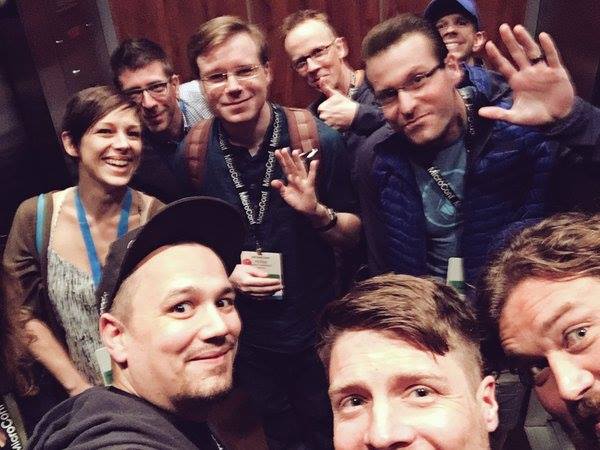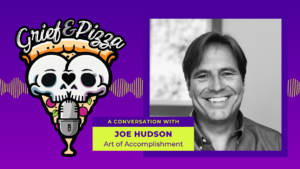I’ll admit, I had no idea what I was getting myself into when I signed up for Microconf.
I didn’t know much about it other than the fact that several people I knew and respected online had called it a “must-attend” conference.

Microconf calls itself The Conference for Self Funded Startups.
It couldn’t have been more perfect.
I’ve attended my share of conferences and events—mostly in the marketing space—but I was looking for something much more specific, and Microconf delivered.
Having recently productized a large part of my business through the creation of Digital Strategy School, I was now in a completely different place with the very, very recent launch of our course platform Doki.
We’d been working on our first MVP (minimum viable product) of our platform Doki for the last year or so, and 2 weeks before Microconf we had finally launched with actual instructors and students on the platform, which was equal parts terrifying and exciting! (If you want to be a beta tester, get on the list for the next round of onboarding, and we’ll send you an invite soon!)
Now, I didn’t know the first thing about marketing software. I’d been reading everything I could get my hands on regarding product development and marketing, lean startup, prototyping, onboarding, user experience design, and even design thinking + innovation.
I can’t tell you how refreshing it was to attend a conference where every session was highly relevant, insightful, and actionable.
Every conversation between sessions offered fabulous and interesting insights from people at every stage of business: still in idea mode, recently launched, focused on growth, sold their first product and working on the next one, and everything in between.
There was such a willingness to be honest and transparent about successes, failures, revenue, growth, stagnation, etc.
I learned just as much from attendees and I did from the speakers and presenters.
And I felt grateful that I was able to contribute my experience and knowledge as well, despite the fact that I was only 1 of the handful of people that wasn’t a technical founder (not to mention, one of a only a handful of ladies it seemed!).
A few other attendees reached out specifically to tell me that they had learned so much from our conversations, and more than one person told me that I had given them both inspiration and tangible, actionable take-aways.
One gentleman asked me how I knew everything I knew about MVP, concierge onboarding, sales page strategy etc, and told me that I needed to “package that up and sell it!”
Often we don’t even realize what we know because we have a lot of the same conversations with the same people; we’re in a knowledge or experience bubble.
Microconf was so great for getting out of that bubble.
It was also a great exercise in learning how to introduce yourself, but that’s a post for another time.
Without going through every speaker and session (Kai has already done that here), I’m summarizing a few of my overall take-aways from the conference.
1. Talk to your customers/users/audience.
If there was anything to be taken away from Microconf, it was this.
Talk to your customers. Talk to your customers.
FOR THE LOVE OF GOD, TALK TO YOUR CUSTOMERS!
Not sure how to price your thing?
Talk to your potential customers.
Not sure if people will pay for the thing you want to create?
Talk to people.
Not sure why people are unhappy with your product?
Talk to them.
One of the most interesting things I noticed from conversations with attendees and from attendee questions was how many people had built something they “saw a need for,” but had never built relationships with people who would actually use the tool.
They had no idea how to get their perfectly polished product into people’s hands, because they hadn’t created any connections and weren’t having real conversations with prospective customers.
You can choose to avoid talking to customers, or you can choose to build and iterate on products people want to use. You are not your customers.
I’d even go so far as to say: build the community before the product.
Buyer Personas
We were also reminded of the importance of creating buyer personas. Patrick Campbell from Price Intelligently illustrated how most of us don’t know our customers very well, don’t measure the right things, don’t test much, and don’t do much customer development.
He showed us how improving retention and monetization was far more beneficial than simply acquisition of new customers. Essentially, it’s a better use of your time to optimize for the customers you already have than to waste your efforts gaining new customers.
“We want customers, but don’t know what to do when we get them.”
He used a practical example of how he helped his mom get started with her Monthly Knitting kits business by using buyer personas to help identify desired features and ideal pricing. (Buyer personas— when done right—work at every level of business, not just a corporate level)
I’ll definitely be taking buyer personas to the next level moving forward!
2. Onboarding is the one thing you have to get right
Closely related to talking to your customers is the notion of watching your customers, from setting up a new account to actually using and moving around your product.
Ben Orenstein gave a brilliant attendee talk about watching real people using your product. It doesn’t matter how obvious you think your onboarding is, you must do user testing with real customers.
Apparently I was nodding so hard during this talk that Ben noticed and thanked me later, ha!
This has been hugely eye opening for us with Doki as we got our first few customers on the platform. We’d built a fairly complex MVP; we had a product that worked, and had (more than) the minimum required features to allow someone to create and sell a course, but we hadn’t yet built in a true onboarding experience.
Concierge Onboarding
This term must have seeped into my subsconscious, because I’d been using to to explain how we were onboarding people to Doki, and didn’t realize this was in fact a real thing.
We were doing “concierge onboarding,” — essentially manually adding people into the platform and adding them to a Slack group so we could monitor any customer support requests, track any requested features or answer questions in real time. We accepted payment for the platform via Paypal since our payment plans weren’t yet built in. We were working with the minimum we needed to do to get people on the platform using it, regardless of limitations. MVP, right?
We now have a product that works, but isn’t yet a delightfully guided experience that would set our customers up for success.
It was unbelievably refreshing to hear “concierge onboarding” is actually an ideal scenario!
One attendee told me to do manual onboarding as long as we could. You end up learning so much about your customers pain points, it’s essentially free market research!
Claire Lew spoke about Know Your Company‘s manual onboarding process. You had to request a meeting with her in order to schedule a demo. This also allowed Claire to tailor the demo to the needs of the person she was speaking to, which contributed to an extremely high signup rate.
To hear again and again the value and importance of onboarding was an important reminder.
Some of the talks referenced examples of how merely improving a product’s onboarding experience was enough to substantially increase monthly recurring revenue. More-so than refining or adding new features, optimizing onboarding proved again to be one of the areas of highest return on time spent.
3. You need an unfair advantage
There’s a sea of same-samey products and services out there. What sets yours apart? What is your unfair advantage? An unfair advantage is one that cannot be copied.
Rob Walling of Drip outlined the 4 unfair advantages as:
1. Be early (first to market)
2. Who you know
3. Who knows you
4. Growth Expertise
I hadn’t really thought of my network and community as being an unfair advantage, so that was a great eye opener.
There were of course so many take-aways from the conference beyond these three points, and I plan to write a bit more about some of the other topics separately or else I fear this post might never end!
I would now consider Microconf to be in my list of must-attend yearly conferences.
Lightning round recap:
- Des Traynor: You need a clear vision of where you’re heading. Pay attention to trends and what’s happening in the market (not just in your own industry. You’ll never feel ready. Onboarding = the single highest leverage thing you can do. Know Why People Switch. Charge more than you think you should.
- Patrick Campbell: Your pricing should align with your buyer needs, grow with your customer, and be easy to understand.
- Claire Lew: Use product demos as customer research. Be willing to turn away customers that aren’t a perfect fit. You’re selling a job to be done, not a hammer. Pick a narrow niche.
- Steli + Hiten: If you’re early in the onboarding process, do anything and everything possible, don’t worry about it’s scalable. Sales, just like entrepreneurship, is about dealing with uncomfortable moments. Train that muscle to become more comfortable with doing uncomfortable things.
- Anna: Use systemized one-on-one demos. Request Demo → Product Video → “Schedule a time with me if you have questions
- Brian Casel: Go after a problem that let’s you charge a higher price point. What is one job you’re currently doing that you should fire yourself from? No matter what type of business you’re running, you need to figure out how to give yourself the time to focus on growing the product line.
- Ben Orenstein: Watch your users using your product. Your mind will be blown.
- Rob Walling: Find your unfair advantage.
- Tracy Osborn: Get an MVP as soon as possible. Always be networking. Hustle.
- Nathan Barry: Don’t divide your attention; give your product the time and space it needs to grow.
- Patrick Collison: “Obsessively watch people use the product and fix the shit that’s stupid”
- Peter Coppinger: Treat your customers like honoured guests. You can’t just “build it and they will come.” Be the CEO of your business. Make sure your url is memorable 😉



Marie, these takeaways are wonderful. THANK YOU for sharing them! That’s not a conference I see myself attending given what I do (although I am attending others more geared toward web designers/devs) so I very much appreciate you distilling what you learned for a wider audience. Stellar stuff.